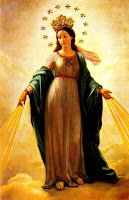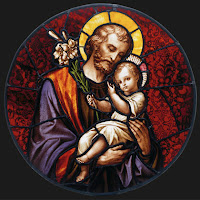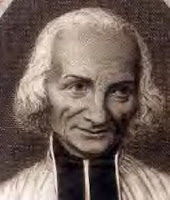Tuesday, January 31, 2012
Implement the Motu Proprio: A Bishop Speaks
Friday, January 20, 2012
The TLM in its new home

Sunday, January 15, 2012
Without Evident Greatness

The much revered image of the Sto. Niño commemorates the holy childhood of our Lord Jesus – the hidden life during which, according to the Catechism of the Catholic Church, the Lord spent “the greater part of his life” sharing “the condition of the vast majority of human beings: a daily life spent without evident greatness, a life of manual labor.” (CCC, 531). This hidden life in Nazareth, about which the Sacred Scriptures gives very few details, embraces much of His life on earth. Whatever we know about our Lord in his public ministry took place only in the last 3 years of his life. 30 years of it was very much spent in anonymity, in hiddenness: “a daily life spent without evident greatness.” The Catechism tells us that one of the purposes of the Incarnation is for the Word of God “to be our model of holiness.” (CCC, 459.) This means that God desires that we imitate his Son so that we can become holy. Often, many people wonder how this can be possible. After all, much of what the Lord did were easily done because of his Divinity. It can be easy for us to justify our failure in imitating Christ by saying, “I am not God like Christ.” It is in His hidden life in Nazareth where the Lord is very much like us who spend our daily lives without evident greatness. The 8 million crowd who drew close to the Nazareno in the 22 hour long procession last Monday – they are the ones like us who spend their daily lives without evident greatness. The Lord spent much of his life being like most of us – without splendor, without evident greatness. It is in the mystery of his childhood that his life resembles very much like ours. And seeing him as so much like ourselves, we find it so much easier to draw close to Him. Perhaps, the similarity of the hidden life of Christ to our very ordinary selves is the reason why Reina Juana of Cebu chose the image of the Sto. Niño from the 3 images presented to her at her baptism. Perhaps, this same similarity becomes the reason for the Sto. Niño’s popularity. What Filipino home is without a Sto. Niño? We are comfortable in seeing the Almighty God as being so much like us. Here He is reachable. Here He is approachable. Here He is accessible. Looking at the Sto. Niño, we realize that the Christian life, as an imitation of Christ, is not impossibly difficult. This is so because God bent himself so low – He became like us, without evident greatness.
And he wants us to draw close to him in the ordinariness of our humanity. That is why he says, “Let the little children come to me. Do not prevent them.” Not only does he want the children to come to him. He wants us to approach Him like little children – without the evident greatness of adult achievement. Last Sunday, we said that one of the reasons why the Magi were believed to be kings is that they were received by Herod – something that can easily be done if they were kings. Today, Jesus receives children. He wants us to approach as children – without the trappings and complications demanded of adults. We can approach him even without proofs of achievements. And to make it easier, the Lord becomes a little child – a Child among children as Herod was king among the Magi who were kings.
“To such belongs the Kingdom of God” – when we look at the Sto. Niño, we see him dressed as King and rightly so. After all, He is the owner of the Kingdom of God. “God will give him the throne of David his father, and his kingdom will be without end.” But in the image of the Sto. Niño, we see this King in the utter ordinariness of a Child. This King is a Child. As a child, He is so much like us. As King, He is so much above us. As a child, He makes it easy for us to approach Him. As King, He gives us the reason why we must approach Him – He has the power to give us what nobody else can: access to the Kingdom of God.
Monday, January 9, 2012
Epiphany and Modern Paganism

The Birth of the Lord took place inconspicuously under the shadows of that silent night, holy night. No one knew of His birth except for our Lady, St. Joseph, and some shepherds who were keeping watch of their flock that night.. Today, guided by a star, magi came and prostrated themselves in homage before the new-born King and they offered him gifts of gold in recognition of his royalty, frankinscense in recognition of his Divinity, and myrrh in recognition of the sacrificial character of his mission.. The coming of the magi brings to fulfillment what Isaiah said: “the wealth of nations shall be brought to you. Caravans of camels shall fill you; dromedaries from Midian and Ephah; all from Sheba shall come, bearing gold and frankinscence, and proclaiming the praises of the Lord.”
Today, the Lord appears to all nations and He invites them to His light. The Magi, coming from the superstitions of their pagan faith, have searched for the true God and found Him in the arms of the Virgin Mary. Guided by the elements of nature, they have discovered the Word through whom all things were made and apart from whom nothing came to be. Because they were deprived of Divine Revelation, they groped in the dark but thanks to signs in the sky, the found the true Light that dispels all darkness and all ignorance. The people who walked in darkness have seen a great light. The Magi began a procession of nations towards the one true Redeemer. And we ourselves are part of that procession for we have accepted the light of the Christian Faith and thus, we emerged from darkness into the Lord’s wonderful light. Thanks to the Cross which the Spanish missionaries planted on Philippine soil, we no longer grope in the dark. Rather, we bask in the light of the Christian Faith. Christianity is the best gift which the Lord has ever bestowed upon our nation for, as the Holy Father said, “Belief in Jesus Christ is the way to arrive definitively at salvation.”
Epiphany, being one of the 4 highest feasts of the Church, must be restored to its original place of prominence in the liturgical year. Unfortunately, Epiphany has become an inconspicuous ending to a holiday season that the world has higly commercialized. Epiphany must once again find its rightful place because its message is ever more relevant today because we find ourselves again in a world that is beset with paganism. The people that once sat in darkness and saw a great light are once again returning to the darkness they came from. And worse, the return to darkness is now disguised as intellectual enlightenment. Christianity is now being packaged as superstition and paganism as the new wisdom. “We cannot accept that salt should become tasteless or the light be kept hidden,” said the Holy Father, “the people of today can still experience the need… to hear Jesus, who invites us to believe in him and to draw upon the sources of living water welling up within him.” “The door of faith is always open for us, ushering us into the life of communion with God and offering entry into his Church. It is possible to cross that threshold when the word of God is proclaimed and the heart allows itself to be shaped by transforming grace. To enter through that door is to set out on a journey that lasts a lifetime. It begins with baptism…and ends with the passage through death to eternal life…To profess faith in the Trinity…is to believe in one God who is Love: the Father, who in the fullness of time, sent his Son for our salvation, Jesus Christ, who in the mystery of his death and resurrection redeemed the world; the Holy Spirit, who leads the Church across the centuries as we await the Lord’s glorious return.”
Sunday, January 1, 2012
Educating the Young in Justice and Peace

The octave of Christmas is also known as the World Day of Peace. For this day, the Holy Father chose as theme: Educating young people in Justice and Peace. Last night, we heard that our Holy Father acknowledge the fact that last year “has been marked by a rising sense of frustration at the crisis looming over society, the world of labour and the economy, a crisis whose roots are primarily cultural and anthropological. It seems as if a shadow has fallen over our time, preventing us from clearly seeing the light of day.” (World Day of Peace 2012) The year that has just concluded was marked by turmoil because young people are frustrated with the way things are. Thus, we saw the occupy Wall Street movement that caught the world in fire. Likewise, we see how one after another, dictatorships in the Middle East collapsed due to popular uprising. There is truly a hunger for justice and peace. And it is really time to start along the way of peace by educating the young according to this path.
Where does education in justice and peace begin? The Holy Father says that it begins in the family. In the Holy Gospel, we heard: The shepherds went in haste to Bethlehem and found Mary and Joseph and the infant lying in the manger. The infant lying in the manger is the Sun of Justice. He is our Peace. The shepherds found the Sun of Justice and the Prince of Peace in the company of Mary and Joseph…in the Holy Family.
The Holy Father writes: “Where does true education in peace and justice take place? First of all, in the family, since parents are the first educators. The family is the primary cell of society; ‘it is in the family that children learn the human and Christian values which enable them to have a constructive and peaceful coexistence. It is in the family that they learn solidarity between the generations, respect for rules, forgiveness and how to welcome others.’ ( BENEDICT XVI, Address to Administrators of Lazio Region and of the Municipality and Province of Rome ,14 January 2011: L’Osservatore Romano, 15 January 2011, p. 7.) The family is the first school in which we are trained in justice and peace.” (World Day of Peace 2012.)
The troubles that afflict the world today are really issues of injustice. When banks and businesses grow while workers become more subjected to poverty…there is injustice. When government cries for the rule of law but resorts to short cuts and say that the end justifies the means…there is injustice. When state laws are manipulated in defiance of natural law…there is injustice. And young generations are disturbed by what they see. For what future is there when laws are constantly manipulated to the advantage of the mighty and powerful? When we grab what we want because the end justifies the means, then we have the beginnings of anarchy.
Jesus, the Prince of Peace, shows us that peace is the fruit of justice. He who is the Son of God was not only born of a woman. He was born under the law. While the Scriptural context of the letter to the Galatians refer here to the law of Moses, I think that by the mystery of the Incarnation, the Son of God subjected himself even to natural law. Such is the humility that was manifested in the Incarnation. The Son of God does not put himself above the law. He placed himself under the authority of human parents. He was born under the law. By his incarnation, the Lord Jesus teaches us the value of solidarity between generations, respect for rules and fair play, forgiveness, and living peacefully with others. Born under the law, the Lord Jesus teaches us that at the very foundation of justice is basically respect for rules, respect for laws. When we place ourselves above the law, we pave the way for injustice.
Human and Christian values must once again be taught in the family if we want to assure the world of a peaceful future founded on justice. The way things are now, young people are easily swayed by ideologies that manipulate them to achieve party goals. This is not the way to peace. We have to go by the way the shepherds took. They went in haste to Bethlehem and search for him who is the Source of Justice and Peace. The Holy Father wrote: “It is not ideologies that save the world, but only a return to the living God, our Creator, the guarantor of our freedom, the guarantor of what is really good and true … an unconditional return to God who is the measure of what is right and who at the same time is everlasting love. And what could ever save us apart from love?” (BENEDICT XVI, Address at Youth Vigil (Cologne, 20 August 2005): AAS 97 (2005), 885-886.) Love takes delight in truth, it is the force that enables us to make a commitment to truth, to justice, to peace, because it bears all things, believes all things, hopes all things, endures all things (cf. 1 Cor 13:1-13).”


.jpg)




